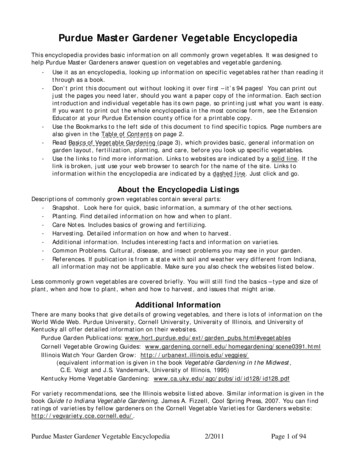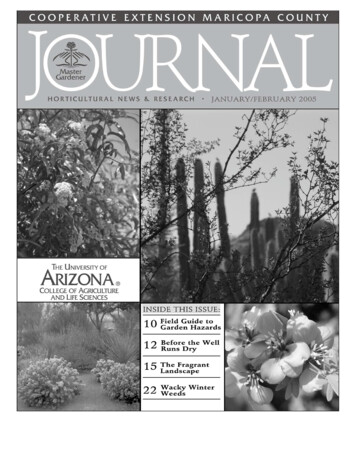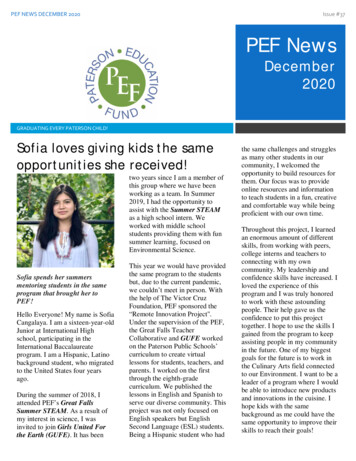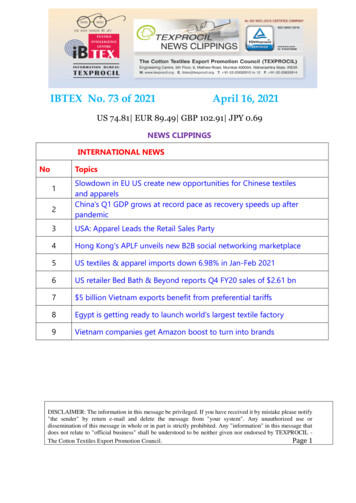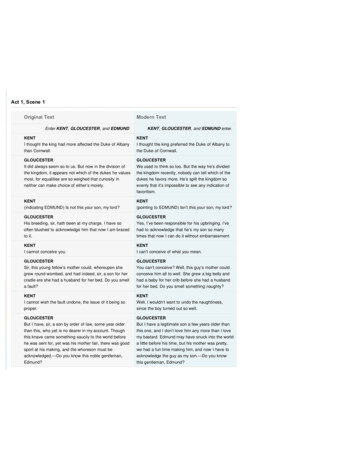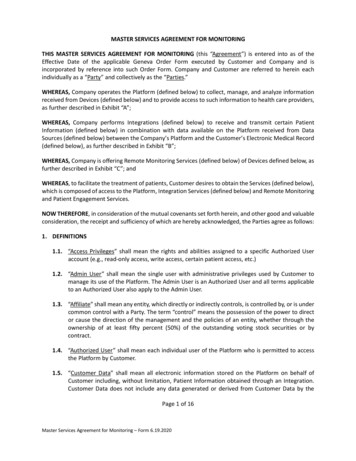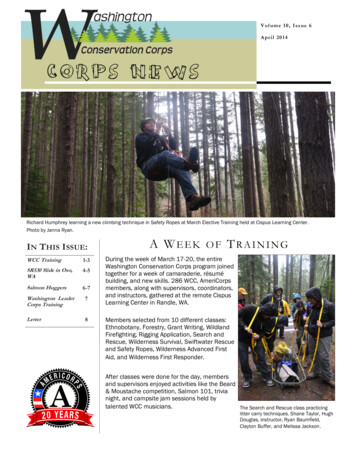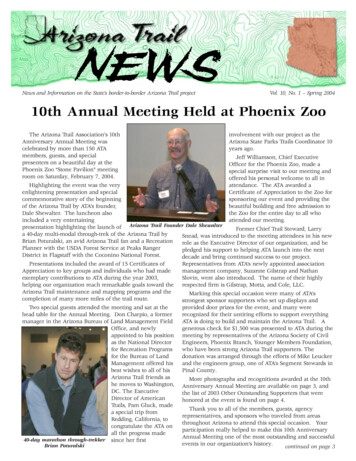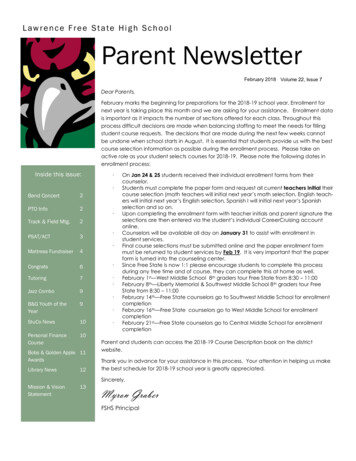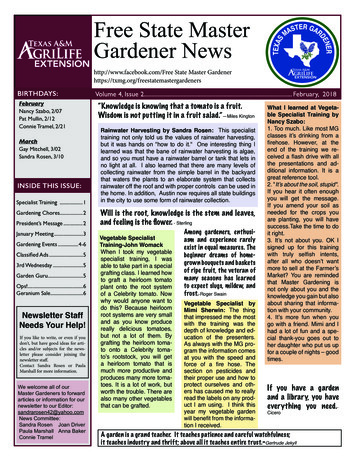
Transcription
Free State MasterGardener Newshttp://www.facebook.com/Free State Master IRTHDAYS:FebruaryNancy Szabo, 2/07Pat Mullin, 2/12Connie Tramel, 2/21MarchGay Mitchell, 3/02Sandra Rosen, 3/10INSIDE THIS ISSUE:Specialist Training . 1Gardening Chores. 2President’s Message. 2January Meeting.3Gardening Events.4-6Classified Ads.53rd Wednesday.5Garden Guru.5Ops!.6Geranium Sale.6Newsletter StaffNeeds Your Help!If you like to write, or even if youdon't, but have good ideas for articles and/or subjects for the newsletter please consider joining thenewsletter staff.Contact Sandra Rosen or PaulaMarshall for more information.We welcome all of ourMaster Gardeners to forwardarticles or information for ournewsletter to our Editor:sandrarosen42@yahoo.comNews Committee:Sandra Rosen Joan DriverPaula Marshall Anna BakerConnie TramelVolume 4, Issue 2. February, 2018“Knowledge is knowing that a tomato is a fruit.Wisdom is not putting it in a fruit salad.”―Miles KingtonRainwater Harvesting by Sandra Rosen: This specialisttraining not only told us the values of rainwater harvesting,but it was hands on "how to do it." One interesting thing Ilearned was that the bane of rainwater harvesting is algae,and so you must have a rainwater barrel or tank that lets inno light at all. I also learned that there are many levels ofcollecting rainwater from the simple barrel in the backyardthat waters the plants to an elaborate system that collectsrainwater off the roof and with proper controls can be used inthe home. In addition, Austin now requires all state buildingsin the city to use some form of rainwater collection.Will is the root, knowledge is the stem and leaves,and feeling is the flower. - SterlingVegetable SpecialistTraining-John WomackWhen I took my vegetablespecialist training, I wasable to take part in a specialgrafting class. I learned howto graft a heirloom tomatoplant onto the root systemof a Celebrity tomato. Nowwhy would anyone want todo this? Because heirloomroot systems are very smalland as you know producereally delicious tomatoes,but not a lot of them. Bygrafting the heirloom tomato onto a Celebrity tomato’s rootstock, you will geta heirloom tomato that ismuch more productive andproduces many more tomatoes. It is a lot of work, butworth the trouble. There arealso many other vegetablesthat can be grafted.Among gardeners, enthusiasm and experience rarelyexist in equal measures. Thebeginner dreams of homegrown bouquets and basketsof ripe fruit, the veteran ofmany seasons has learnedto expect slugs, mildew, andfrost.-Roger SwainVegetable Specialist byMimi Sherwin: The thingthat impressed me the mostwith the training was thedepth of knowledge and education of the presenters.As always with the MG program the information comesat you with the speed andforce of a fire hose. Thesection on pesticides andtheir proper use and how toprotect ourselves and others has caused me to reallyread the labels on any product I am using. I think thisyear my vegetable gardenwill benefit from the information I received.What I learned at Vegetable Specialist Training byNancy Szabo:1. Too much. Like most MGclasses it’s drinking from afirehose. However, at theend of the training we received a flash drive with allthe presentations and additional information. It is agreat reference tool.2. "It’s about the soil, stupid".If you hear it often enoughyou will get the message.If you amend your soil asneeded for the crops youare planting, you will havesuccess.Take the time to doit right.3. It’s not about you. OK Isigned up for this trainingwith truly selfish intents,after all who doesn’t wantmore to sell at the Farmer’sMarket? You are remindedthat Master Gardening isnot only about you and theknowledge you gain but alsoabout sharing that information with your community.4. It’s more fun when yougo with a friend. Mimi and Ihad a lot of fun and a special thank-you goes out toher daughter who put us upfor a couple of nights – goodtimes.If you have a gardenand a library, you haveeverything you need.CiceroA garden is a grand teacher. It teaches patience and careful watchfulness;it teaches industry and thrift; above all it teaches entire trust.-Gertrude Jekyll
Page 2Free State Master Gardener News, February, 2018February Gardening ChoresTommy PhillipsCounty Extension Agent, Ag/NRFebruary is one of those months that you never know what "Mother Nature" is going to have in store for us. It could be sunnyand in the 70's one day.and then a freak cold blast the next. However, "Mother Nature" and her issues aside, there are thingsthat we can continue to do in the garden this month.Planting* Continue to plant evergreen shrubs, fruit, nut and shade trees.* Plant asparagus, beets, broccoli, brussel sprouts, cabbage, carrots, cauliflower, cilantro, collards, English peas, lettuce,kohlrabi, onion transplants, parsley, potatoes, radishes, spinach, Swiss chard, and turnips.* Plant early spring-blooming annuals like dianthus, petunias and alyssum in late February.Pruning Complete pruning of oak trees before February 15 Prune other shade trees and woody shrubs as necessary to remove dead wood and improve structure. Finish pruning pecan trees and fruit trees before spring bud break. Prune all standard roses, except climbing varieties, by about 50% by mid- February. Prune tall Nandinas, if necessary, to improve fullness, by removing one-third of the tallest canes at 2-3" above ground level(late February). Repeat the next two years. Trim or mow grassy groundcovers such as liriope and mondo grass, if needed, due to freeze damage or ragged appearance,before spring growth begins.Plant Care Apply horticultural oil to fruit and pecan trees, and to scale-prone shrubs such as euonymus and hollies, when temperatureis 45-65 for two weeks (mid-February). Check the Texas A&M Agrilife Extension Service website bookstore for a pamphlet onthe Homeowner's Fruit and Nut Spray Schedule. Fertilize cool season grasses such as fescue and ryegrass with a slow release fertilizer. Apply pre-emergent herbicides to established lawns to control warm season broadleaf and grassy weeds, such as dandelionsand crabgrass no later than early March. Fertilize pansies and other winter annuals with your favorite fertilizer. Continue to protect tender plants from hard freezesPresident's MessageI hope everyone enjoyed the many activities we had last year as well as all the new programs we initiated such as moving our membership meetings to the County library, the public library series, the years ofservice awards and the volunteer hours awards. We plan to continue with those again this year plus adda few new things into the mix. Topics for the membership meetings are being finalized as well as the LibrarySeries which will kickoff in May. Remember this is a program where we want our own Master Gardenersto share their knowledge with the public. Congratulations to the 2017 Intern Class for finishing your first year with our Association, and we look forward to your active involvement in 2018. I'm pleased to announce that it appears we will have 11 or 12people in our 2018 Intern class which includes three couples. Also being planned for 2018 is both a Spring and a Fall publicseminar. The Spring one is going to be called “Growing Fruit in East TX” and the Fall seminar is entitled “Perennials, Annualsand Texas Natives in the Landscape” which will be presented by Steve Chamblee of the Chandor Gardens in Weatherford.Steve is an excellent speaker and a contributor to Neil Sperry’s column. Both events will be held at St. Therese CatholicChurch in Canton. I’m also excited to be working with a few new board members, Mimi Sherwin, Louella Iliff and Connie Tramel. Big shout out to both Paula and Sally for also staying on for another year. Lastly, I would like to put in a plug for the StateMaster Gardener 40th Anniversary Conference in April. Registration is open and to encourage our membership to attend thisthree day conference the board has agreed to reimburse each one 100 to help defray the cost; see me or one of the otherboard members for more information.
Page 3Free State Master Gardener News, February, 2018January Program, Growing TransplantsAt the January meeting, Lowell Tanksley showed members how to nurtureand grow transplants, and talked aboutraising vegetables on Tanksley Farmsnear Hainesville. It was his second program for the FSMG’s, and once again,he showed slides of his farm and themore than 20 beautiful acres of healthycrops he grows. The pictures werebreathtaking showing bushels of bountiful produce he sells at the LongviewFarmers’ Market, and Granary HealthFood stores in Lindale and Tyler duringthe spring and summerThis man knows what he’s talkingabout! He is a “go-to” for feedback andadvice sought by experts. Several of thearea’s AgriLife agents rely on him forinformation about many topics, and theTexas A&M AgriLife Research Center inOverton has him test new varieties ofvegetables they are developing.He shared a story about a tomato hetrialed for Overton, and the result wasa mealy, flavorless fruit. He advisedthe Overton people that it was so badhe wouldn’t even offer it to his customers for fear they would be afraid to buytomatoes from him again. (Let’s hopeOverton took his advice and that thetomato isn’t in nurseries for sale thisyear!)Lowell’s soil is extremely sandy, andhe has learned to consistently feed it bygrowing cover crops and using differentamenities, mostly organic. He highlyrecommends corn gluten meal whichserves as a good herbicide as well as aslow-release nitrogen source. He plantsElbon Rye throughout the year in areasthat are not actively growing crops, andadds compost whenever he can, mostof which he produces from his own garden waste and a neighbor’s aged horsemanure.He answered many questions frommembers throughout the program, givingadvice on how to keep a garden healthy,and naming his choices of vegetableMiscellaneous:Sulphur increases “sweetness” of vegetables;“Hands on Agronomy” by Neal Kinsey, isa book he recommendsby Paula Marshallvarieties that he finds grow and taste thebest. I wish I had a video of Lowell’s entirepresentation because it was loaded withhelpful information. In my opinion, this isone of the most useful, informative andenjoyable programs we have had. Manythanks to Mimi and Louella for schedulingLowell, and I hope we will have him backagain. BTW we have an inside sourceto help get Lowell scheduled; he’s JimmiePierce’s brother!Recommended Products:Medina Soil Activator, andMedina HastaGro,“Nature’s Care Really Good"compost (can be found at WalMart or Tractor Supply),Sun Gro 360 potting mix for growingtransplants (Long Feed in Mineola)Recommended Varieties:Plant short-day onions, Candy AppleRed, Yellow Granex, 1015’s (if growingonions for storing, uncover the bulbswhen fairly large, leaving only the rootsin the soil so they don’t rot)Tomatoes: Celebrity, BHN 589, EarlyGirl, heirloom Cherokee Purple, Chocolate Stripey, Chef ’s Choice, Sun Gold,Sweet 100; Aristotle Pepper; Golden Zucchini; Sunburst squashEarly Jersey Wakefield Cabbage (sweet);Sugarsnax carrot (keep soil loose toraise long carrots);Sugar Cubes cantaloupe;plant only hybrid radishes; April CrossDaikon radish is a good one for Kinchiand stir fry.Mr. Tankley's Vegetable Stand is located near Hainesville.
PagePage 42Free State ate MasterGardening Events – Mid-Winter, 2018By Connie TramelSmith County Master Gardeners at the LibraryFree lectures of 2018 at the Tyler Public Library:http://txmg.org/smith/coming-events or by calling 903-590-29802- 9 S mith Co. Ag. Greg Grant, Texas Tough, History of theTexas Superstar Plant Program3-19 Wayne Elliott, Raised Bed Gardening on a Hillside2-2-P arking at Canton Trades Days, contact Pat Mullin903-820-8556, to volunteer, this is a fund raiser.2-10 - C herokee Co. MG, The Birds & Bees,Greg Grant, vendors, books, plants, First ChristianChurch, 1920 Beaumont St., Jacksonville, TX2-10 - 10-12am Keep It Rosy! Dr. Peter Schaar slashes throughrose myths and teaches proper pruning and care of rosesat The East Tx Arboretum & Botanical Society, AthensSpecialist Training Offerings in 2018Plant Health and Diagnostics Education– February 8-9, 2018, hosted by Gonzales CountyVegetables – February 14-16, 2018, hosted by DallasCountyEarth-Kind Landscaping – February 19-20, 2018,hosted by Bastrop CountyPropagation – March 23-24, 2018, hosted by TarrantCountyIrrigation Efficiency – March 23-26, hosted by DallasCountyRainwater Harvesting – April 30-May 2, hosted byDallas CountyGreenhouse Management – May 23-25, 2018, hostedFebruary 16-17 - Tommy has partnered with the Texas A&Mby Hill Country in Kerrville, TXForest Service to host a Tree Workshopon Friday at the Free State Building (at fairTexas Superstars – September 18-20, 2018, hosted bygrounds). This will be to address items related Smith Countyto trees after the tornadoes, plus a variety ofother topics such as: Can My Tree Be Saved? Further Information and Registration is available Current Tree Health Issues in East Texas for all these classes on the Texas Master GardenerFire-Wise Landscaping; This will be open to theWebsite - www.Txmg.org., then Specialist Trainingpublic and limited to 75 participants (due to space).Help is needed on Saturday, February17 with the Tree Planting. We have designated Cherry Creek Park as a location to receive close to15 container trees to be planted. MG help is needed prior to that event (possibly on Friday the 16th –afternoon) to locate good spots and on the day of the event to help d
and Texas Natives in the Landscape” which will be presented by Steve Chamblee of the Chandor Gardens in Weatherford. Steve is an excellent speaker and a contributor to Neil Sperry’s column. Both events will be held at St. Therese Catholic Church in Canton. I’m also excited to be working with a few new board members, Mimi Sherwin, Louella Iliff and Connie Tra-mel. Big shout out to both .
